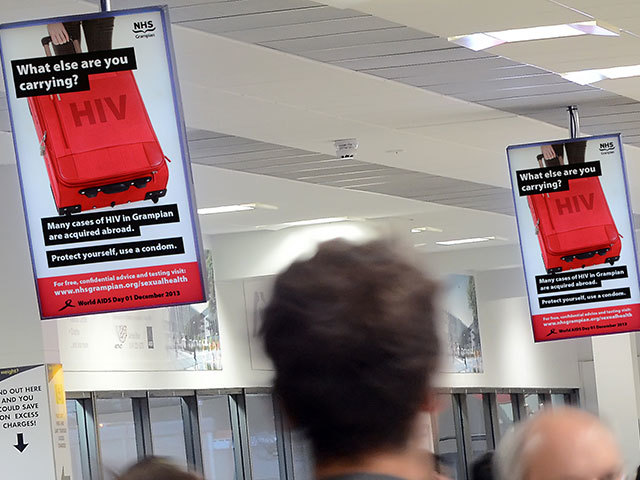
A call was today made for oil and gas companies to play a more active role in the fight against HIV.
The call came after it was revealed the number of HIV diagnoses in the Grampian area rose in the past year.
One health professional even dubbed condoms as the “forgotten PPE”.
Energy Voice sat down with NHS Public Health Consultant Dr Emmanuel Okpo, who confirmed oil workers stationed in HIV-prone areas like Sub-Sahara Africa, contributed to the increased numbers.
“The main risk is having unprotected sexual intercourse,” he said.
The infectious disease specialist said despite the public outreach and educational campaigns carried out since the virus first appeared on the public’s radar, too many workers still harbour a nonchalant attitude and fail to understand how truly at risk they are.
He pinpointed Africa, Eastern Europe and South America, all areas industry workers are regularly deployed to, as the most susceptible areas.
“It comes down to people thinking it’s not going to happen to them – they’re not going to catch it,” he said.
“But the truth is if you’ve put yourself at risk you can be affected. What we’re trying to do now is get a very clear message out. If you’ve been putting yourself at risk you need to get tested.”
In 2013, the number of HIV diagnoses was 47 up from the previous year’s 42.
Dr Okpo added the worst thing an oil worker returning from a post abroad can do is assume they’re in the clear just because the symptoms don’t manifest themselves right away – much like another north-east man did.
The man, who did not want to be named, was working abroad when one boozy night changed his life forever.
He said: “I have worked abroad for 20 years. After a night with colleagues and a few too many drinks, I had unprotected sex.
“At first I thought I was ill with malaria but after further tests I was diagnosed with HIV. I am now receiving treatment and feel healthier than I have in a long time.
“I would urge everyone to use protection and if you haven’t – get tested. HIV doesn’t just affect you, it affects your family, your friends and everyone around you.”
Dr Okpo warned this man’s case isn’t an isolated one. Oil workers who have been stationed on remote bases for weeks on end looking for reprieve on a night out are most susceptible to contracting the virus.
“Alcohol tends to reduce people’s perception of risk,” he said.
But it’s the workers, who have unknowingly contracted HIV and ignored the initial symptoms, that he worries about the most. By the time they come forward their body has been defeated and deprived of its ability to fight back.
He said: “When you first get HIV you many just have a fever or a rash which eventually both go away. You then might have a period where you have no symptoms at all, but then you get to the period where you have AIDs.
“By the time this happens your immune system is destroyed and it makes it much more difficult to treat. Your risk of dying is grossly higher.”
But Dr Okpo insisted this isn’t about a blame game with the oil industry. Instead a bid to extend a bridge and get the sector to work side-by-side with the health service to deliver the necessary education and treatment. He added the NHS was also pursuing ways to provide discreet on-site testing at major oil and gas offices in Aberdeen.
Dr Okpo said he expected the number of confirmed cases to in Grampian to continue to rise. But he added the increased figure would be a sign that industry and health authority were getting it right, because more people were coming forward to get tested.
“Some people don’t see this as a positive thing, but instead think they’re being attacked,” he said.
“But it’s about raising awareness and working with the oil and gas industry and people themselves.
“Ultimately, the risk of HIV is significant to the oil and gas industry because you’re talking about your workforce. When people become infected they may not be able to work. For any sector HIV is a burden but for the oil and gas industry the effect would be much greater.”
The first the step is education, according to Dr Okpo. This involves discussing unprotected sex and even the risks of having medical and dental treatment abroad, both of which HIV can be contracted through.
He also suggested companies make a concerted effort to provide condoms in isolated bases abroad.
“We need to provide this service in a cultured way,” he said.
“Some people argue that if you provide condoms you’re encouraging people to have sex. But we argue whether you provide them or not people are going to have it.”
The second step is treatment.
“The industry can help us raise awareness with staff going abroad and staff coming to Aberdeen from abroad,” he said.
“They need to be talking about HIV, it’s risks and the testing available. It would be good if the oil and gas industry can encourage their staff to get tested.
“We’re trying to work with the sector to make the treatment readily available.”
He added: “People don’t always have the time to come in and get tested. All we need is a room.”
A discreet area located within industry buildings allows people to be tested during their workday and receive the results in 48 hours, according to Dr Okpo.
“Historically, there was a stigma associated HIV and it wasn’t something people openly discussed especially because it was associated with sex,” he said.
“But there’s now effective treatment for HIV. People are living longer, healthier lives and not developing AIDs.
“The stigma is less and less and now HIV can thought of as a chronic disease like hyper-tension – something where you can take your medication and live your life.”
Recommended for you
